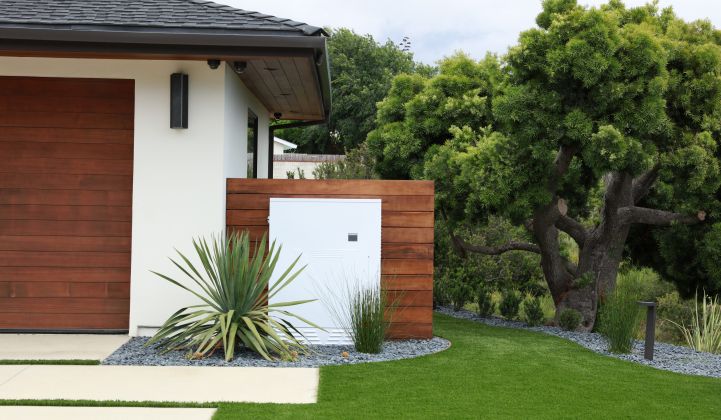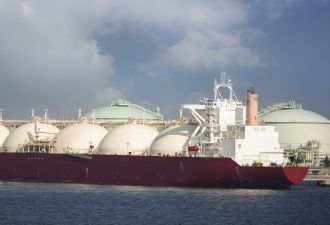Before he retired from the Marine Corps, Col. Brent Willson commanded bases and managed procurement for a $100 billion portfolio of helicopters and tilt-rotor aircraft, including the Osprey vertical takeoff and landing vehicle.
Now he's competing to build better home battery systems.
Willson's San Diego-based startup NeoVolta emerged when a friend in the solar industry asked for his thoughts on the existing field of home energy storage systems. Willson did his due diligence but didn't find anything entirely to his liking. He wanted something with the safety, performance and cycle life of a sonnen system, but at a price that could compete with Tesla's Powerwall.
That combination did not exist, so Willson designed it, secured white-labeled manufacturing partners, and opened an integration facility in Poway, outside of San Diego.
Compared to shepherding advanced military aircraft into production, "This is much easier," Willson said in a recent interview.
Now he's shipping 50 units a month, priced at around $13,000 each, competing with the more established names in the small but growing ecosystem of home battery providers.
NeoVolta's offering highlights gaps in the existing field. Homeowners have had to choose from just a handful of prominent vendors supplying the nascent home storage market. But the market is growing, and California's worsening wildfires, plus utilities' preemptive blackouts, have made a compelling case for home backup power, even as time-of-use rates undermine the value proposition of existing solar customers.
"The U.S. residential storage market is still young and thus remains open for new entrants," said Brett Simon, a Wood Mackenzie analyst covering behind-the-meter energy storage.
Longer lasting
All the leading batteries on the market can perform the same basic tasks, namely, shifting solar generation and ensuring backup power.
"For a new entrant to win out, it would have to demonstrate something superior...a lower price point, improved performance or some other perceived advantage," said Simon.
The NV14 product clocks in at 14.4 kilowatt-hours, slightly more energy storage capacity than a Powerwall and significantly more than LG Chem's 9.8 kilowatt-hour Resu. Its inverter can charge or discharge 7.7 kilowatts of instantaneous power, also more than the mainstream competitors.
The product uses lithium-iron-phosphate chemistry, which has lower risk of catching fire than the more popular NMC battery chemistry.
Willson designed his enclosure to encapsulate the inverter and automatic transfer switch, so the only external item needed is a critical load panel that comes with the package. This avoids the clutter of ancillary equipment boxes that other storage products require, but which seldom appear in promotional photographs.
The NV14 accepts AC power from solar inverters, but it can also take output directly from DC solar panels. That makes the product appealing for retrofits on solar systems with inverters at the end of their useful life. To add an AC-coupled battery system would require buying a new inverter at the cost of thousands of dollars; instead, installers can plug the old solar straight into the NV 14.
NeoVolta advertises a warranty for 10 years or 50,720 kilowatt-hours of throughput. The company's youth and independence, though, create a risk that it won't be around to honor the warranty years from now. Nonetheless, the company told Greentech Media, "We have agreements with suppliers and the means to cover 10-year warranties."
Unconventional strategy: An IPO
At first glance, the pathway to market as an upstart storage manufacturer seems fraught with difficulty.
Tesla enjoys tremendous brand recognition thanks to Elon Musk's pivotal role in popularizing home storage technology and the company's EV business. LG Chem has the backing of one of the premier cell manufacturers, and a strong partnership with Sunrun, the top U.S. rooftop solar installer, which has delivered 8,000 home storage systems so far. Sonnen, less widely known in the U.S., was acquired by oil major Shell.
NeoVolta chose an unconventional strategy to go up against these formidable incumbents. It went public.
After taking $1.5 million in private investment, the company held an initial public offering in May that raised $3.5 million at $1.00 per share, according to a November filing with the Securities and Exchange Commission.
IPOs remain extremely rare for the cleantech sector, and dollar rounds even more so. The irregular approach, however, did generate enough cash to get manufacturing started without a series of dilutive venture capital rounds. The money raised should fund operations for at least a year, the filing noted.
"I just put my foot on the gas and, 'Let's go, what am I waiting for?'" Willson said.
The company plans to distribute through installer partners rather than taking on that role itself. NeoVolta started selling to San Diego-area solar installers in May and has since expanded into Los Angeles and Northern California. Distribution channels in Florida, Arizona, Nevada, Canada and Hawaii are coming in the next few months, Willson said.
The financial reporting provides an unusual degree of transparency into the company's operations. NeoVolta sold 38 units in the three months ending September 30, at a gross profit margin of around 20 percent, the filing noted.
Since then, sales have ramped up to 50 units per month, Willson said, and he expects to hit 100 per month early next year. The factory has capacity to assemble 10,000 units in a year, leaving ample room to grow.
Easier for installers
San Diego-based installer SolarTech Energy Systems was the first partner to sign on. The company employs around 75 people and manages 15 installation crews, said Director of Operations Grant Magoffin. Previously, SolarTech had installed batteries from sonnen, Tesla and LG Chem.
Not every battery can be installed on every home at a reasonable price, Magoffin said, but NeoVolta covers most of them.
"It is the perfect setup for the standard home where people are looking to get a large backup storage facility in terms of kilowatt-hours relative to their home’s electricity needs," he said.
NeoVolta is geared for critical load backup, though, so customers looking for whole-home backup will gravitate toward Tesla or sonnen. Doing so typically requires several Powerwalls, however, and Magoffin said he stopped installing sonnen because it was roughly twice as expensive as Tesla ("It doesn’t work well for Southern California, where prices are already high for utilities and housing," he said of the sonnen product).
Tesla has the incumbency advantage; more customers have heard of it, and it has been on the market for several years. It's also backed by a famed car manufacturer with a market cap of $63 billion. But NeoVolta packs some characteristics that appeal to economically minded installers.
"The cost to install a NeoVolta is actually less," Magoffin said.
SunTech has installed the NeoVolta battery in six hours on average, whereas Powerwalls average a day and a half due to the extra wiring and electrical work they require. With more practice, the teams could get to a point of installing two NeoVolta systems in one day, Magoffin added.
High school science teacher Matt Farley got an NV14 installed in less than a day at his house in the foothills east of San Diego. Since the late July installation, the utility cut power to the area twice due to high fire risk; one outage lasted a day, the next one for more than two days. But with the battery running, "We wouldn’t have really noticed," Farley said.
Farley took out a loan for the purchase, but the federal tax credit and state rebate knocked off about half of that amount.
"If you are somewhere where your power’s going to get shut off, I’d definitely recommend it," he said. "It’s super affordable for the peace of mind."
SolarTech's Magoffin also liked that NeoVolta includes the critical load panel in the package, noting that other brands require the installer to order that separately. And the ability to retrofit onto existing solar without forcing a new inverter purchase sets it apart from the competition.
It's not clear that old solar retrofits will generate much business overall, Simon cautioned, because the solar market 15 years ago was miniscule compared to new adopters today. But it could represent a niche that NeoVolta can specialize in as it gets off the ground.




